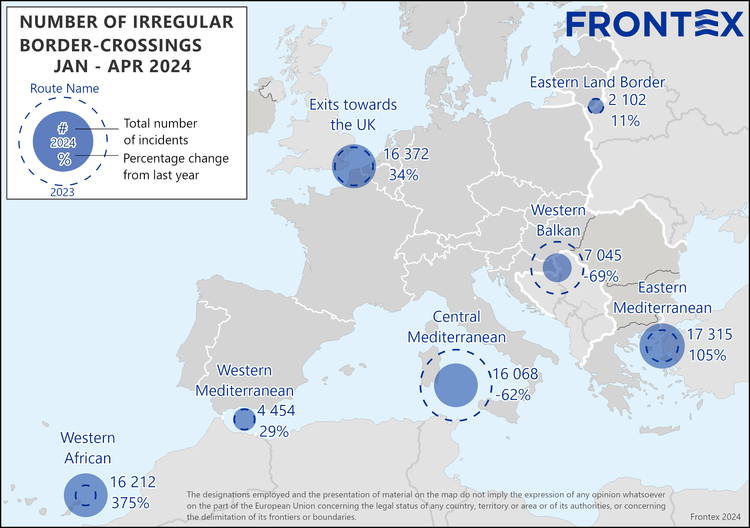EU External Borders: Irregular Border Crossings Decrease by 23% from January to April 2024

Preliminary data indicate that irregular border crossings into the European Union dropped by 23% in the first four months of 2024, totaling approximately 63,400. The Western Balkans and Central Mediterranean routes saw the most significant decreases in detections, with declines of 69% and 62% respectively. In contrast, the Western African and Eastern Mediterranean routes experienced substantial increases, with rises of 375% and 105% respectively.

(Image Credit: frontex.europa.eu)
Key highlights for the first four months of 2024 include:
- Central Mediterranean: Detections decreased by 62% year-on-year, with slightly over 16,000 irregular crossings. April saw nearly 4,600 arrivals, down almost 70% from the previous year.
- Western Balkans: Recorded a 69% reduction in detections, totaling just over 7,000.
- Western African Route: Noted a dramatic 375% increase in arrivals to the Canary Islands, with over 16,200 irregular arrivals, the highest since data collection began in 2011. April alone saw over 3,100 arrivals, nearly matching the total for the first four months of last year.
- Eastern Mediterranean: Became the most active route, with detections more than doubling to over 17,300 in the first two months.
(Read More: Addressing India-China Border Tensions: Modi’s Call for Peace)
Top Nationalities on All Routes: Syria, Mali, and Afghanistan.
Criminal Activity: Smugglers in Mauritania have capitalized on the increased demand from sub-Saharan migrants, cramming more people onto Cayuco boats, thereby increasing the risk to those onboard.
Safety Concerns: Sea crossings remain perilous. According to the International Organization for Migration (IOM), 568 individuals have been reported missing in the Mediterranean this year, predominantly on the Central Mediterranean route.
Channel Route: Detections increased by 34%, reaching over 16,300 in the first four months.
Frontex remains dedicated to protecting the EU’s borders, with over 2,800 officers and staff engaged in various operations. The preliminary data represent detections of irregular border crossings, noting that the same individual may be counted multiple times if crossing at different locations.



Leave a Reply